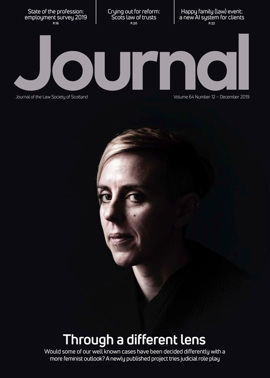Two new crofting decisions published
The courts have been fairly quiet on the reporting of agricultural matters this quarter. Nonetheless, below I discuss two recent crofting decisions by the Scottish Land Court.
Marrow v Johnston SLC/142/18
A tenant crofter on the Isle of Harris brought an appeal challenging the first registration of the respondent’s croft under s 14(1) of the Crofting Reform (Scotland) Act 2010.
The crux of this dispute was whether an old corn mill ruin (running between adjacent crofts) fell within the appellant’s croft (croft 4) or the respondent’s (croft 5). The evidence produced was contradictory, and despite the Land Court’s request for further information about the historic use of the mill, nothing substantive was submitted. The court therefore considered the evidence under four separate headings: (i) the information provided by the late tenant of croft 5; (ii) the geographic position of the mill; (iii) the various maps produced; (iv) statements provided by third parties. It concluded:
- the evidence was “neutral” and neither argument could be preferred over the other;
- the mill’s position indicated that it was attributed to croft 4. However, this was not determinative given its clear historic use by croft 5 tenants;
- although the maps supporting the appellant’s position were produced by the relevant Government department and the previous tenant of croft 5 had not challenged them, they were not taxative plans and should not be relied on; and
- statements provided by locals with connections to the crofts were significant, providing information dating back 80 years, and were unanimous that the old mill fell within croft 5.
The court considered that the third party statements should be afforded the greatest weight, and the appellant’s challenge therefore failed.
Tayburn v Crofting Commission SLC/18/18
An appeal was brought under s 52A(1) of the Crofters (Scotland) Act 1993 against a decision by the Crofting Commission under s 27 of the Act to refuse an application by a Lewis crofter to sublet her croft to the appellant. Broadly, the Commission refused the application under various paragraphs of s 58A(7) of the Act, believing on the balance of evidence that acceptance of the application would generally be more detrimental than beneficial to the crofting community.
The grounds of appeal were under s 52A(3)(a)-(f). However, the court felt that the complaints fell principally under paras (a) (“erred on point of law”) and (c) (“acted contrary to natural justice”).
The appellant argued in relation to s 58A(7)(a)(i) that it was not specifically the tenant who should live within 32km of the croft: “any person” could fulfil this requirement. Although the court agreed that the provision should not be interpreted narrowly, the fact that the Commission had considered the tenant’s residence did not amount to an error in law.
A second error was said to have been to have regard to the “interests of the estate” under s 58A(7)(b): this was subject to s 27(1) of the Act whereby “a crofter was entitled to sublet his croft [for under 10 years] without consent of the landlord”, and therefore the estate’s interests were immaterial. The court disagreed, stating that simply because the landlord could not refuse a subtenant did not imply that these interests were irrelevant.
It was argued that the Commission should only have been guided, and not “bound”, by the criteria in s 58A(7), and the dominant consideration should have been growing the crofting population. The court noted however that as the crofter (rather than subtenant) would remain in situ, there would be no change in the crofting population.
The court felt that many of the appellant’s objections were manifestations of procedural unfairness and absence of natural justice. Overall it believed that the Commission managed the case improperly and unfairly by failing to provide clarity to all parties as to what information could fairly be considered and what should be disregarded. In particular, it should not have considered new grounds of objection beyond the 28 day limit after public notification, and should have provided all parties with equal opportunity to respond to issues. Its failure to apply the principles of natural justice required the court to quash the Commission’s decision and remit the case for reconsideration.
Parliamentary business
In other news, the Agriculture (Retained EU Law and Data) (Scotland) Bill was recently introduced in the Scottish Parliament. Notably, the bill gives ministers powers to amend CAP legislation, post-Brexit. The Rural Economy & Connectivity Committee has requested comments from interested parties to be provided by 3 January 2020.







